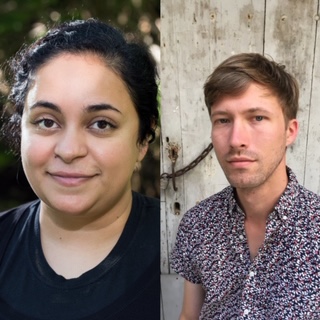Before jumping into their work at the Stegner reading last Tuesday, Feb. 23, Stegner Fellows Jim Whiteside and F.T. Kola dedicated their readings to the memory of Eavan Boland, the former director of the Creative Writing Program.
Whiteside, a poetry fellow, reminisced about getting the acceptance call into the program from Boland herself, describing it as “one of life’s greatest surprises to be a Stegner Fellow.” In turn, Kola thanked Boland for the gift of supportive writing communities.
Unlike typical Stegner readings in front of a hushed crowd, this one took place in a Zoom seminar. The absence of audience reactions and ambient murmurs was exchanged for a different experience, almost as if each reader was sharing their work with each audience member individually.
Whiteside began the reading with his poem “Reckoning,” which was dedicated to his partner. He voiced a fondness for the imperfect and marred: “I confess, I love picking misshapen fruit — what stores would never take.” Whiteside credited his upbringing in the American South, a place of “rust, dinged up things [and] old trucks” — for his desire to seek beauty and art in atypical things.
Other themes in his poems included mourning and loss, and many of them referenced his late father who passed away from a prolonged illness four years ago. His poem “Shovel” reads, “One thing that grief does is impact memory … it runs backwards and forwards.” Whiteside continued to provide sharp, unflinching lines about the absence of his father in “Clock with Reverse Gears.” He says, “I have a father and then suddenly I don’t … this is the part that doesn’t change back.”
Whiteside hinted at a “shifting of gears” in his future work with a focus on childhood and how queer people “hide in plain sight.” He recounted his belated realization that the first gay person he knew was his family’s next-door neighbor, which prompted him to think about how queer people fit into rural and suburban environments.
Kola — introduced affectionately as “Fatima” by Fellow Lydia Conklin — read an excerpt from her novella “Main Street USA.” The story followed a family moving from South Africa to the United States and the difficulties that came with their acculturation. Although the event only allowed time for the small snippet of the story, the poignant themes of transition, endurance and connection were readily apparent.
In the short Q&A session afterward, both writers discussed the impact of COVID-19 on their work. Whiteside acknowledged the difficulty of producing content during a pandemic, since it disrupts his practice of writing in cafes. Kola said, “It puts everything into focus … getting work done is the one part of my life I can control.”
They also discussed how their work had changed since entering the Stegner Fellowship. Kola described her gratitude for the other Fellows and their writing, and how participating in the Fellowship introduced her to new possibilities within her own stories. Whiteside emphasized that his writing was completely different from when he entered the program: “I’ve been trying to write a more patient poem, a poem that trusts itself, that gives [itself] time to unfold.”
